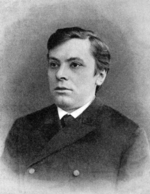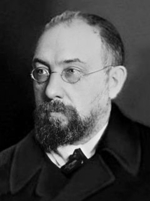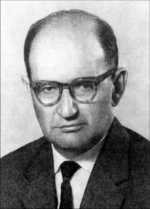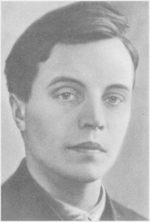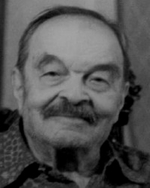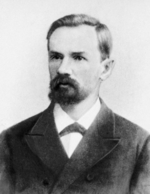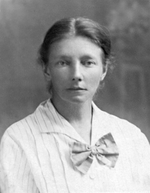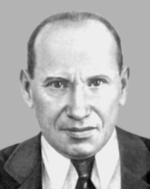Articles
Boldyrev Alexander (1896–1941)
Boldyrev Alexander (1896–1941) – philologist, specialist in Classical literature, translator.
In 1914, after graduating with a gold medal from the Petrishule in St. Petersburg, he entered the Classical Department of the Historical and Philological Faculty of the St. Petersburg University, where he studied at the courses of F.F. Zelinsky, S.A. Zhebelev, M.I. Rostovtsev, B.V. Farmakovsky, and A.I. Maleina. In 1916, interrupting his studies at the university, he graduated from the accelerated officer courses of the Corps of Pages and went to the front, where he served in the artillery as a battery commander until the spring of 1918.
Read More
Bolotov Vasily (1853–1900)
Bolotov Vasily (1853–1900) – ecclesiastic historian, Orientalist.
He was born in a family of a church lector; studied at the Ostashkovo Spiritual School (1863-1869) and Tver’ Spiritual Seminary (1869-1875). In 1875, he enrolled at the Ecclesiastic History Department of the St. Petersburg Spiritual Academy, where he studied ancient and contemporary languages. In 1878, he graduated from the academy; in 1879, he got his Master degree. In 1879, he also became Docent; and in 1884 – Ass. Prof, and in 1896 – Full Prof. at the Chair of Ecclesiastic History. He served at the Ministry of Foreign Affairs as translator, where he got the rank of Active State Councillor out of order; B. took part in shaping foreign ecclesiastic politics (transferring Urmian Nestorians into Orthodoxy; establishing communion of Old Catholics with Orthodox Church).
Read More
Bonch-Bruevich Vladimir (1873–1955)
Bonch-Bruevich Vladimir (1873–1955) – state and social person, historian; in 1917–1920 – manager of Sovnarkom, later dedicated himself to research work. He headed the Sector of the History of Religion and Atheism at the Institute of History of the Ac. of Sc. of the U.S.S.R. (1947-1955), at the same time he worked at different other positions, for instance – Director of the Museum of the History of Religion of the Ac. of Sc. of the U.S.S.R. (1946-1955). In 1884-1889, he studied at the Moscow Land-Surveying Institute; for the participation in students’ protests he was excluded and exiled to Kursk under police surveillance; there he finished his course at the land-surveying trade school. In 1892, B. returned to Moscow. Since 1895, he participated in the activity of Social-Democrats, later entered into the Moscow Workers’ Union.
Read More
Bondar Semen (1875–?)
Bondar Semen (1875–?) – government official and researcher of minority religious groups in Russia.
He graduated from the Poltava Theological Seminary, then, from the Moscow Theological Academy with the Ph.D. degree in Theology; later, he taught Russian and Church Slavonic languages at the Pereyaslavsk Theological School of the Poltava Province; from 1902 to 1917, he served in the Ministry of Domestic Affairs, at the Department of Spiritual Affairs of Foreign Confessions. The period of his biggest research activity falls on the years 1908-1916. In 1908-1911, B. worked under the leadership of A.N. Kharuzin, a prominent anthropologist who headed the Department of Spiritual Affairs of Foreign Confessions. It was then, that three of his major monographic studies were published: ‘Seventh Day Adventism’, ‘English Episcopal Church’, and ‘The Current State of Russian Baptism. A Note’.
Read More
Boriskovsky Pavel (1911–1991)
Boriskovsky Pavel (1911–1991) – archeologist, specialist in Paleolithic.
He was born in a family of a medical doctor. After the Leningrad State University, B. studied at the post-graduate courses under the supervision of P. P. Efimenko. In 1934, he defended his thesis ‘Historical premises of shaping the so called Homo sapiens’. In 1934, he became Docent at the Leningrad Institute of History, Philosophy and Linguistic, and worked also at the sector of distance learning at the Historical Faculty of the Leningrad State University. In the same year, he got a position at the Sector of Field Research of the State Academy of the History of Material Culture; and in 1935 – of the Institute of the History of the Pre-Class Society at the same Academy.
Read More
Borisov Andrey (1903–1942)
Borisov Andrey (1903–1942) – specialist in Semitic and Iranian studies, worked also in the field of Arabic studies.
In 1924, he enrolled at the Oriental Department of the Leningrad State University and studied Semitic languages and literatures. His main supervisors were P. C. Kokovtsov (Semitic studies) and I. Yu. Krachkovsky (Arabic studies). He had special interests to Jebrew-Arabic philosophical texts and Aramaic epigraphy. In 1926, he traveled to Middle Asia, visited Tashkent, Bokhara, and Samarcand. In 1928, he gor his diploma and worked at the Asian Museum (Institute of Oriental Studies of the Ac. of Sc. of the U.S.S.R.) for nine months. In 1930, he entered the Hebrew Department of the State Public Library as Ass. Librarian. He worked there till 1933 and had to give up because of a conflict with Hebraist J. J. Ravrebe.
Read More
Borovsky Yakov (1896–1994)
Borovsky Yakov (1896–1994) – specialist in Classic philology, translator, poet in New Latin.
In 1906–1915, learnt in the Sixth St. Petersburg (Petrograd) Gymnasium, where he early demonstrated his interest to classic languages and antiquities. In 1915-1917, he studied at the Polytechnic Institute; in 1917, he trasfered to the Petrograd University where he studied till 1922 (with a break when he served in the Red Army in 1918-1920). After graduation he was invited to the Research Institute of Comparative History of Literature and Languages of West and East; in 1924-1927, B. worked there as Researcher. Thanks to his knowledge of foreign languages, in the late 1920-s, he worked at the Department of Foreign Media of the Comintern. Since 1928, he has been lecturer, and since 1933 – at the Chair of Classic Philology of the Leningrad State University.
Read More
Brilliantov Aleksander (1867–1933)
Brilliantov Aleksander (1867–1933) – Church historian, Correspondent Member of the Ac. of Sc. at the Historical and Philological Department from December 6, 1919.
He graduated from the St. Petersburg Spiritual Academy (1891); made lectures there at the Chair of General Ecclesiastic History (1900–1918); after closing the academy, taught at the First Petrograd Teachers-Training Institute (1918–1922) and at the Petrograd Theological Institute (1920-1923). He worked at the Public Library (1921–1930) as Chief Librarian, and Head of the First Department (library of the former St. Petersburg Spiritual Academy) (1925–1930). Doctor in Ecclesiastic History without defending thesis (1914). Member of the Commission on the History of Knowledge, Ac. of Sc., and the Russian-Byzantine Commission, Ac. of Sc. His main works were on the Church history. He was arrested on the ‘Academic Case’ and died in the exile in Tambov.
Read More
Briullova-Shaskolskaya Nadezhda (1889–1937)
Briullova-Shaskolskaya Nadezhda (1889–1937) – She was born in a gentry family of the Briullovs; a granddaughter of architect and painter A. P. Briullov. She got secondary education at the Vasileostrovskaya Female Gymnasium in St. Petersburg and enrolled at the Historical and Philological Faculty of the High Female Courses. After successful graduation, she was invited by Proff. Zelinsky and Rostovtsev at the Chair of Classic History and Philology and was sent for an educational trip to Germany and Italy. She studied at the Universities of Wien and Heidelberg, at the Archeological Institute of Rome. She wrote her Master thesis in German on the topic of Roman Animism: ‘Der Romische Animismus’ but because of the start of WWI the research has not been published.
Read More
Budovnitz Isaak (1897–1963)
Budovnitz Isaak (1897–1963) – historian.
In 1922, he graduated from the Institute of National Economy, worked for various newspapers; since 1938, he was Executive Secretary and than Chief Editor of the periodical collection of research articles ‘Istoricheskie zapiski’ (Historical Notes); from 1944 till 1958, he worked at the Institute of History of the Ac. of Sc. of the U.S.S.R. In 1945, he defended his Candidate thesis on the history of Russian publicism of the sixteenth century. His main research interests laid in the field of the history of social thought of medieval Russia. Particularly, he studied ‘The Tale of Igor’s Campaign’ – mostly in the aspect of the analysis of the author’s views.
Read More
Showing 31-40 of 351 items.


